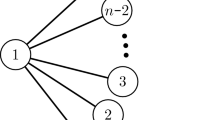Abstract
Since their introduction by Erdős in 1950, covering systems (that is, finite collections of arithmetic progressions that cover the integers) have been extensively studied, and numerous questions and conjectures have been posed regarding the existence of covering systems with various properties. In particular, Erdős asked if the moduli can be distinct and all arbitrarily large, Erdős and Selfridge asked if the moduli can be distinct and all odd, and Schinzel conjectured that in any covering system there exists a pair of moduli, one of which divides the other. Another beautiful conjecture, proposed by Erdős and Graham in 1980, states that if the moduli are distinct elements of the interval [n, Cn], and n is sufficiently large, then the density of integers uncovered by the union is bounded below by a constant (depending only on C). This conjecture was confirmed (in a strong form) by Filaseta, Ford, Konyagin, Pomerance and Yu in 2007, who moreover asked whether the same conclusion holds if the moduli are distinct and sufficiently large, and \(\sum _{i=1}^k \frac{1}{d_i} < C\). Although, as we shall see, this condition is not sufficiently strong to imply the desired conclusion, as one of the main results of this paper we will give an essentially best possible condition which is sufficient. More precisely, we show that if all of the moduli are sufficiently large, then the union misses a set of density at least \(e^{-4C}/2\), where
and \(\mu \) is a multiplicative function defined by \(\mu (p^i)=1+(\log p)^{3+\varepsilon }/p\) for some \(\varepsilon > 0\). We also show that no such lower bound (i.e., depending only on C) on the density of the uncovered set holds when \(\mu (p^i)\) is replaced by any function of the form \(1+O(1/p)\). Our method has a number of further applications. Most importantly, as our second main theorem, we prove the conjecture of Schinzel stated above, which was made in 1967. We moreover give an alternative (somewhat simpler) proof of a breakthrough result of Hough, who resolved Erdős’ minimum modulus problem, with an improved bound on the smallest difference. Finally, we make further progress on the problem of Erdős and Selfridge.
Similar content being viewed by others
Notes
Moreover, as recounted in [5], Erdős (who thought that such coverings are likely to exist) offered $25 for a proof that there is no covering with these properties, and Selfridge (who expected the opposite) offered $300 (later increased to $2000) for a construction of such a covering.
To be precise, we can set \(Q \cdot {{\mathbb {P}}}_i(x+Q{\mathbb {Z}}):=Q_i \cdot {{\mathbb {P}}}_i(x+Q_i{\mathbb {Z}})\). Note that, since \(\gcd (Q_i,Q/Q_i)=1\), we can (via the Chinese Remainder Theorem) consider \({{\mathbb {P}}}_i\) on \({\mathbb {Z}}_Q \cong {\mathbb {Z}}_{Q_i} \times {\mathbb {Z}}_{Q/Q_i}\) as a product measure of \({{\mathbb {P}}}_i\) on \({\mathbb {Z}}_{Q_i}\) with the uniform measure on \({\mathbb {Z}}_{Q/Q_i}\).
References
Balister, P., Bollobás, B., Morris, R., Sahasrabudhe, J., Tiba, M.: The Erdős-Selfridge problem with square-free moduli. Algebra Number Theory 15, 609–626 (2021)
Dusart, P.: The \(k\)th prime is greater than \(k(\log k + \log \log k-1)\) for \(k\ge 2\). Math. Comput. 68, 411–415 (1999)
Erdős, P.: On integers of the form \(2^k + p\) and some related problems. Summa Brasil. Math. 2, 113–123 (1950)
Erdős, P., Graham, R.L.: Old and New Problems and Results in Combinatorial Number Theory. Monographies de L’Enseignement Mathématique, No. 28 (1980)
Filaseta, M., Ford, K., Konyagin, S.: On an irreducibility theorem of A. Schinzel associated with coverings of the integers. Ill. J. Math. 44, 633–643 (2000)
Filaseta, M., Ford, K., Konyagin, S., Pomerance, C., Yu, G.: Sieving by large integers and covering systems of congruences. J. Am. Math. Soc. 20, 495–517 (2007)
Hough, R.: Solution of the minimum modulus problem for covering systems. Ann. Math. 181, 361–382 (2015)
Hough, R., Nielsen, P.: Covering systems with restricted divisibility. Duke Math. J. 168, 3261–3295 (2019)
Schinzel, A.: Reducibility of polynomials and covering systems of congruences. Acta Arith. 13, 91–101 (1967)
Acknowledgements
This research was largely carried out during a one-month visit by the authors to IMT Lucca, and partly during visits by various subsets of the authors to IMPA and to the University of Memphis. We are grateful to each of these institutions for their hospitality, and for providing a wonderful working environment.
Author information
Authors and Affiliations
Corresponding author
Additional information
Publisher's Note
Springer Nature remains neutral with regard to jurisdictional claims in published maps and institutional affiliations.
The first two authors were partially supported by NSF grant DMS-1855745, the third author was partially supported by CNPq (Proc. 304237/2016-7) and FAPERJ (Proc. E-26/202.993/2017), and the fifth author was supported by a Trinity Hall Research Studentship.
Rights and permissions
About this article
Cite this article
Balister, P., Bollobás, B., Morris, R. et al. On the Erdős covering problem: the density of the uncovered set. Invent. math. 228, 377–414 (2022). https://doi.org/10.1007/s00222-021-01087-5
Received:
Accepted:
Published:
Issue Date:
DOI: https://doi.org/10.1007/s00222-021-01087-5




